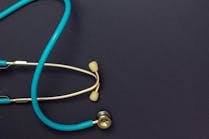By the time this edition publishes, the second season of AppleTV+’s hit TV show Severance will have aired. For those not familiar with the show, here’s a brief description of the premise from Wikipedia:
“Employees at the biotechnology corporation Lumon Industries, assigned to highly classified projects, must undergo ‘severance’—a medical procedure that implants a device in their brain ensuring they retain no memories of the outside world while at work and no recollection of their job once they leave. This results in two distinct personalities for each employee: the ‘innie,’ who exists solely within Lumon, and the ‘outie,’ who lives their personal life outside of work.”
I’m not sure if my feature this month on staffing was subconscious or not (I’ve been pretty obsessed with Severance since the second season began in January), but the industry experts included in my piece said a lot of eye-opening things regarding staffing and healthcare careers. Of course, I imagined what it would be like if healthcare professionals were “severed”—only their “innie” would know what is going on at the hospital and their “outie” would be none the wiser to the supply chain decisions they made that day or the patients they visited bedside.
One particular comment that really stuck out to me in my piece this month was from John R. Mehall, MD, MBA, president, Innovative ECMO Concepts. He told me, “The constant need to be available for many years takes a toll. For example, when my family and I went out to dinner, we took two cars because I might have to leave at any moment to go to the hospital. People don’t often think about that side of the job."
So, obviously, a healthcare facility filled with severed employees would probably be extremely dangerous, not to mention a logistical nightmare (no spoilers, but for those who watch, can you say, “overtime contingency?”), as physicians and other workers often take calls outside of work. What’s more, healthcare staff truly care about their patients and facilities. I’ve said this many times throughout my editorial career: healthcare workers are truly some of the most compassionate and caring individuals on the planet.
And finally, this brings me to my last point. This month we also featured our 2025 Sterile Processing Department of the Year. Congratulations to UF Health Shands! As we celebrate the incredible work of UF Health Shands, let’s not forget: the “innies” of healthcare—those who often work behind the scenes or in the quiet moments of night shifts—need support too. Let’s ensure they don’t have to live with the burdens of a severed work-life balance.

Janette Wider | Editor-in-Chief
Janette Wider is Editor-in-Chief for Healthcare Purchasing News.





